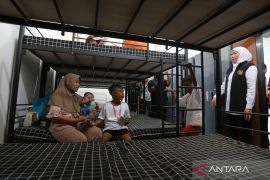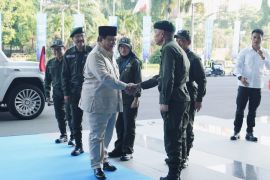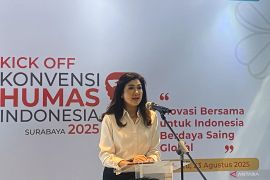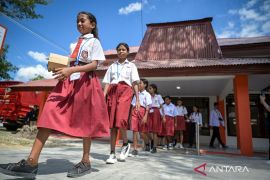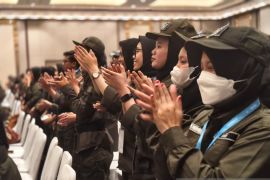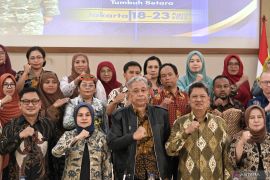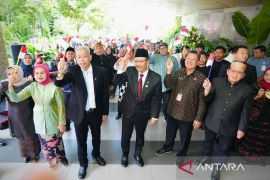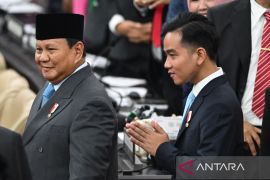Poverty - the inability to afford basic needs, which commonly includes clean and fresh water, nutrition, health care, education, clothing and shelter - is the number one public enemy, which the government is aiming to address.
The number of poor people in Indonesia is still high, and therefore, the government will continue to speed up its poverty-eradication efforts.
Around 30 million Indonesians live below the poverty line, accounting for about 11 percent of the country`s total population of 240 million.
Therefore, Social Affairs Minister Salim Segaf Al Jufri has said that the government will reduce the poverty rate to 8 or at least 10 percent by 2014.
During the Fifth Bali Democracy Forum in Nusa Dua, Bali, early in November 2012, the social affairs minister said that around 30 million Indonesians live below the poverty line.
"Indonesia has approximately 4.5 million neglected children and 2.8 million elderly people," the minister said at that time.
Meanwhile, the Central Statistics Agency (BPS) Chief Suryamin said BPS data in March 2012 indicated that the number of poor people had dropped to 29.13 million.
According to him, Indonesia`s poverty rate fell 0.53 percent in March 2012, compared with the same month in 2011, when 30.02 million or 12.94 percent of the total population reportedly lived below the poverty line.
"Over the past year, the number of poor people in urban areas has declined by 399,500, to 10.65 million from 11.05 million, while the number of poor people in rural areas dropped by 487,000, to 18.48 million from 18.97 million," Suryamin said.
He noted that the increase in the daily wages of farm workers and construction workers during the first quarters of 2011 and 2012 was one of the factors that led to a reduction in the number of poor people.
Therefore, President Yudhoyono said, the government`s efforts to reduce poverty by creating more jobs were not merely a discourse, because it had already taken concrete steps to achieve the goal.
According to the president, the government had formulated strategies and policies to take concrete steps across the country in an effort to correct or improve the situation.
President Yudhoyono also said that to overcome three major problems, namely unemployment, poverty and foreign debt, the government had created many job opportunities and launched educational, health and housing development programs.
Yudhoyono has also noted that although poverty is inevitable and substantial, the government will continue to try its best to systematically reduce the number of poor people.
"Poverty reduction has always been the priority since independence, starting from Soekarno, and then followed by Soeharto, Habibie, Abdurahman Wahid and Megawati. Therefore, the duty must be continued," the head of state said in Yogyakarta early in October this year.
According to the president, the number of people whose earnings were above the national average per capita income was rising, but the issue of poverty was still bothering him.
"Even though the number of people living below the poverty line has decreased to approximately 20 or 30 million, I think it`s still quite an enormous number," he added.
Therefore, President Yudhoyono said, the central government should work together with regional governments, state enterprises and private companies in order to eradicate poverty.
In his state of the nation address during a plenary session at the House of Representatives on August 16, 2012, President Yudhoyono noted that the government had implemented various programs, grouped under four clusters, in its effort to alleviate poverty.
"The four clusters are expected to improve the quality and livelihood of the people of Indonesia in a fair and equitable manner," the President said at that time.
He noted that the first cluster involved Direct Assistance of Rice for Poor Families (Raskin), School Operation Assistance Funds (BOS), and Family-Based Poverty Alleviation programmes.
The second cluster deals with the implementation of the National Programme for Independent Community Empowerment (PNPM), while the third cluster includes the development of micro, small and medium enterprises through People Business Credit (KUR) and Corporate Social Responsibility (CSR).
Finally, the fourth cluster comprises an "inexpensive housing programme, provision of inexpensive public transportation facilities, equitable distribution of clean water and electricity, the welfare of fishermen, as well as of poor people in urban areas."
Meanwhile, Vice President Boediono said that the National Programme for Independent Community Empowerment is only one of the models of poverty-alleviation in the country.
"The pattern cannot recklessly be applied without showing its success," he said in his opening address to the Community Empowerment Work Expo and Awards 2012 at the Jakarta Convention Hall in September.
The vice president said he always took the chance to look at the realization of the program whenever he visited various parts of the country.
"By doing so, I can feel how big the benefit of the program is for the people," he said.
The success of the program is inseparable from the two principles underlying it, namely philosophy and operational mechanism, he noted.
"From the standpoint of philosophy, PNPM is a program from, for and by the people. That is the most essential element of the people`s welfare," he said.
(O001/KR-BSR/A014)
Reporter: Otniel Tamindael
Editor: Jafar M Sidik
Copyright © ANTARA 2012
